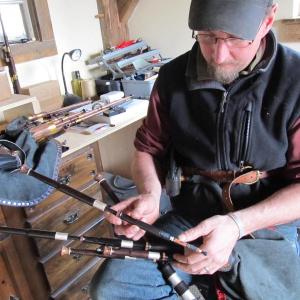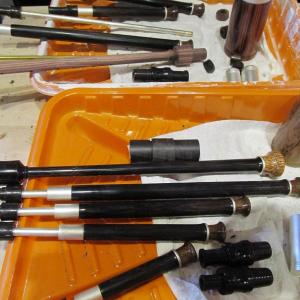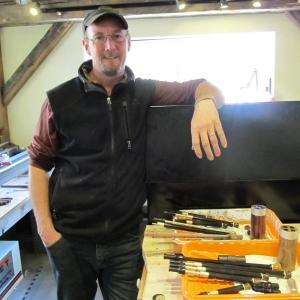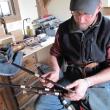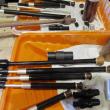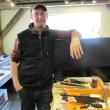The craft of making Scottish smallpipes by hand
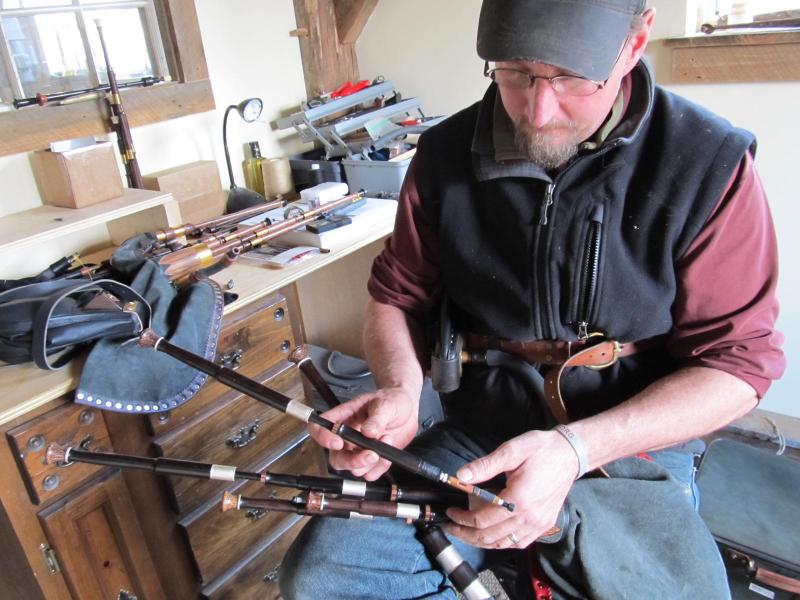 Chris Pinchbeck displays his own set of Scottish smallpipes. (Photo by Kay Stephens)
Chris Pinchbeck displays his own set of Scottish smallpipes. (Photo by Kay Stephens)
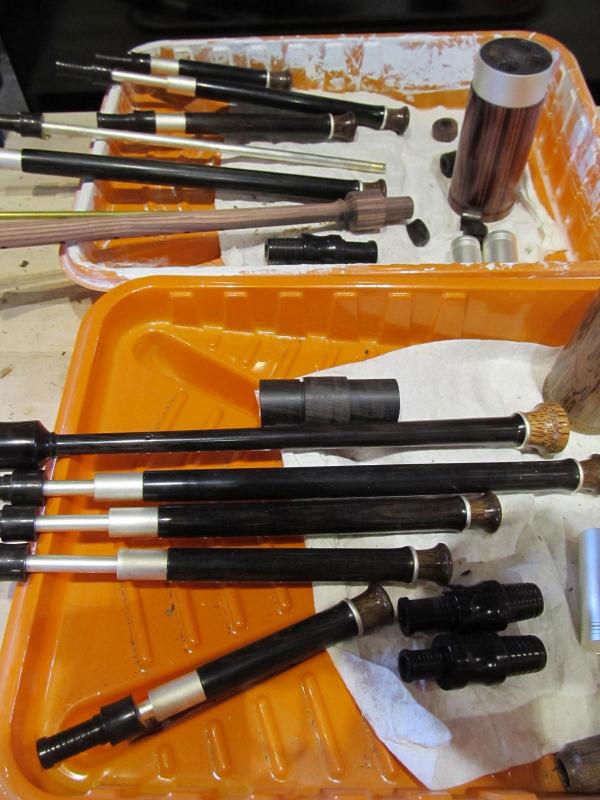 Two sets of pipes he's producing for customers that are three weeks out. (Photo by Kay Stephens)
Two sets of pipes he's producing for customers that are three weeks out. (Photo by Kay Stephens)
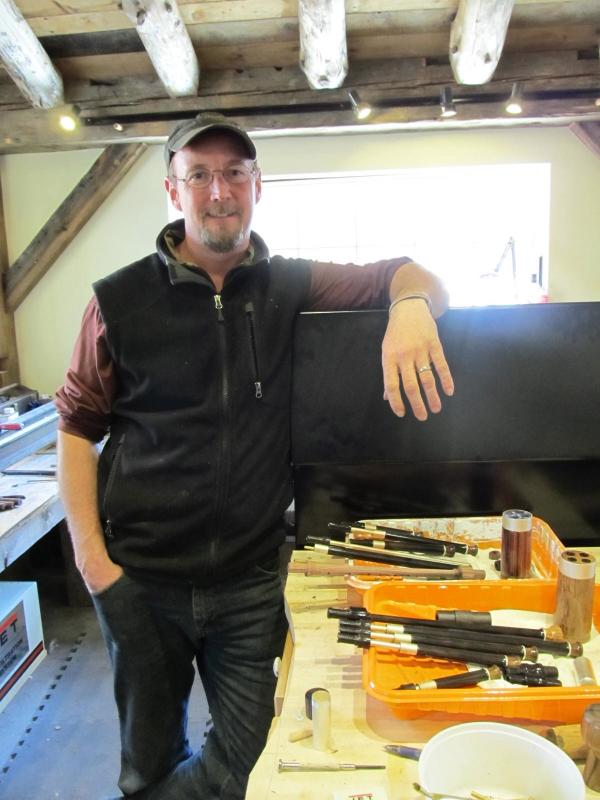 Musician and craftsman Chris Pinchbeck stands in his new shop, which he built using timbers from the property's 1820s Colonial farmhouse. (Photo by Kay Stephens)
Musician and craftsman Chris Pinchbeck stands in his new shop, which he built using timbers from the property's 1820s Colonial farmhouse. (Photo by Kay Stephens)
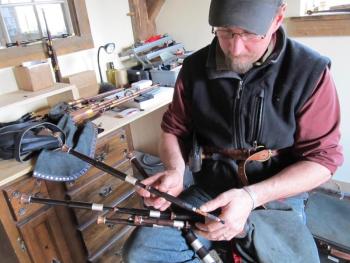 Chris Pinchbeck displays his own set of Scottish smallpipes. (Photo by Kay Stephens)
Chris Pinchbeck displays his own set of Scottish smallpipes. (Photo by Kay Stephens)
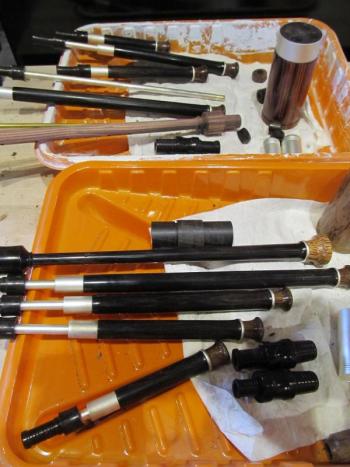 Two sets of pipes he's producing for customers that are three weeks out. (Photo by Kay Stephens)
Two sets of pipes he's producing for customers that are three weeks out. (Photo by Kay Stephens)
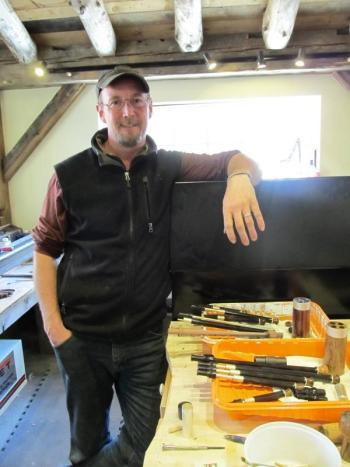 Musician and craftsman Chris Pinchbeck stands in his new shop, which he built using timbers from the property's 1820s Colonial farmhouse. (Photo by Kay Stephens)
Musician and craftsman Chris Pinchbeck stands in his new shop, which he built using timbers from the property's 1820s Colonial farmhouse. (Photo by Kay Stephens)
HOPE — From inside the newly-built, rustic shop across the street from the Hope General Store, Chris Pinchbeck plays Irish music on his iPod while he works on a couple sets of Scottish smallpipes for customers. They're about three weeks from being completely finished. Behind him is a 1938 South Bend machinist's lathe that he found on Uncle Henry's that he uses for boring holes, for chanters and metal cutting.
Pinchbeck grew up in Guilford. Graduation from the University of New Hampshire was followed by a few years in California, and then he came back to Maine to resume his photography business, where he met his future wife, Lindsay. Together they built this bagpipe shop — along with a new children's arts center next door called Sweet Tree Arts — from an 1820s Colonial farmhouse. Lindsay also happens to be the sister of Andrew Stewart, owner of The Hope General Store, and it's a delight for Hope residents to have this family running three artistic and community-minded businesses in the center of town.
Given that Andrew and Lindsay are both Scottish, and that Scottish kids grow up playing pipes the way American kids do with recorders and harmonicas, the obvious question was: did they teach him to play?
"No, I was playing the bagpipes long before I met Lindsay," Pinchbeck said with a laugh. "In fact, she jokes with me, 'if you'd learned how to play the pipes after you met me, then I probably wouldn't have married you.'"
Pinchbeck first started to play bagpipes nearly 19 years ago and his deep passion for the music has turned into a business.
"They say it takes 22 years to become a bagpiper, and yet I don't feel like I'm even a 20th of the way there yet," he said. For him playing the highland bagpipes naturally led to playing the Scottish smallpipes, which are not only easier to handle, but, in his words, "less obnoxious sounding."
"There are about 200 kinds of highland pipes. Every culture has a set they call their own, the Irish and the French, and so forth. They were originally designed as 'war pipes' to be as loud and jarring as possible when played well. Behind a hill with a few men playing them, they were designed to scare the the enemy into thinking that there were thousands of men behind the hill waiting for them," he said.
The Scottish smallpipes, which are much smaller — have a more melodic, quieter sound. They were developed back in the 1980s and are "kind of considered the new kid on the block, " he said. "These were invented as a way to practice playing the larger highland pipes without the blasting volume and to blend this highland music into playing with other instruments, such as fiddles, guitars and concertinas."
For the past 15 years, he has worked on mastering the Scottish smallpipes. Only in the last four years has he set out to craft each individual piece of the pipes himself.
"You have to start somewhere and dive in. There's not a lot of tutelage on how to make a set of bagpipes," he said, pointing to his "wall of shame" (a window ledge) holding early templates that weren't up to his standards. Pinchbeck is now one of five commercial Scottish smallpipe producers in the U.S. and finds his customers through the Internet, at workshops and through local word of mouth.
"It's not an easy instrument to play," he said, strapping a custom bellows on across his chest. It takes years to learn all the fingering and the right amount of pressure to put on the bellows and bag so that air flows through to keep the instrument in tune and steady. He picks up the chanter, the actual piece that he will play, which looks like a cross between an oboe reed and a bassoon. The drones are the pipes that rest on his shoulder.
Pinchbeck said he has no plans for playing out on St. Patrick's Day, as he's got to take care of his two young children, but check out his website, pinchbeckpipes.com, for more information and any future public perfomances.
Watch our video to see Pinchbeck play a tune called Jenny Nettles. "All my friends laugh at me becuase this is the one I play the most," he said. That tune thenwhich then blends in with another called, The Piper is Weird. (Assuredly, he's not.)
Contact Kay Stephens at news@penbaypilot.com.
Event Date
Address
449 Camden Road
Hope, ME 04847
United States

